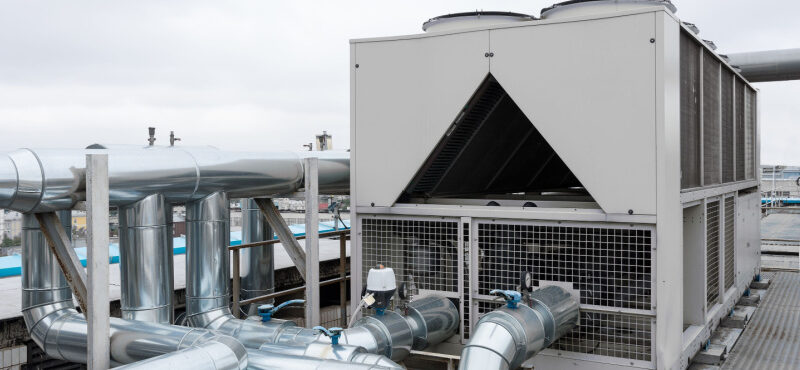Lack of information often leads to a lot of confusion when it comes to choosing a large-scale or commercial cooling solution. While air-cooled and water-cooled chillers have their upsides and downsides, with recent advancements in cooling technology, choosing between them has become even more challenging.
The choice between air-cooled and water-cooled chillers depends on various factors such as the size of your application, water availability, energy efficiency requirements, budget, and environmental considerations. Air-cooled chillers may be more suitable for smaller applications with lower cooling loads and limited water availability, whereas water-cooled chillers may be more appropriate for large-scale applications with higher cooling loads and access to ample water supply.
Here are some key points to help you determine which option may be more suitable for your business:
Design and Space Requirements
Air-cooled chillers use ambient air to dissipate heat from the refrigerant, while water-cooled chillers use water as a cooling medium. Air-cooled chillers typically consist of a compressor, condenser, evaporator, and fans, whereas water-cooled chillers have additional components such as cooling towers, pumps, and a water loop.
Air-cooled chillers generally require less space compared to water-cooled chillers. They do not need a separate cooling tower, which can take up significant space. Air-cooled chillers are often preferred in applications where space is limited or expensive, such as rooftop installations or urban environments with limited land availability.
Performance and Efficiency
Water-cooled chillers are generally more efficient than air-cooled chillers in terms of their cooling capacity and energy consumption. Water has higher heat transfer properties compared to air, allowing water-cooled chillers to achieve higher efficiency and better performance in large-scale applications with high cooling loads. However, air-cooled chillers may be more suitable for smaller applications or when water is scarce or expensive.
Installation and Maintenance
Air-cooled chillers are typically easier and less expensive to install compared to water-cooled chillers, as they do not require additional components such as cooling towers or water loops. They also have lower maintenance requirements as they do not involve water treatment, water quality monitoring, or regular cleaning of cooling towers.
On the other hand, water-cooled chillers may require more maintenance and monitoring due to the additional components involved. They may also require access to a reliable and adequate water source for optimal functioning.
Cost
Air-cooled chillers are generally more cost-effective in terms of initial investment, as they have lower installation and maintenance costs compared to water-cooled chillers. Water-cooled chillers may require higher capital investment due to the additional components and infrastructure required, such as cooling towers and water loops. However, water-cooled chillers may offer long-term energy savings due to their higher efficiency, which can offset the higher upfront costs in certain cases.
Environmental Considerations
Water-cooled chillers consume significant amounts of water for their operation, which may be a concern in regions where water is scarce or costs more. In contrast, air-cooled chillers do not consume water, making them more environmentally friendly. However, air-cooled chillers require fans to dissipate heat, which consumes electricity and may contribute to higher electricity consumption and greenhouse gas emissions compared to water-cooled chillers.
Final Take
In summary, air-cooled chillers are generally preferred in applications where space is limited, and lower upfront costs and simpler maintenance are prioritized. Water-cooled chillers are typically more energy-efficient, quieter, and more reliable, but they require additional space, maintenance, and operational costs associated with cooling towers and water treatment. The selection between air-cooled and water-cooled chillers depends on specific project requirements, such as cooling capacity, available space, and energy efficiency.
If you are a business in Miami Lakes looking for optimal cooling solutions, Cooling Power Corp can help. We provide industry-grade cooling systems, backup power solutions, clean air equipment, and emergency equipment on a rental basis at competitive prices. If you have any questions or want to learn more about our service, contact us today!

